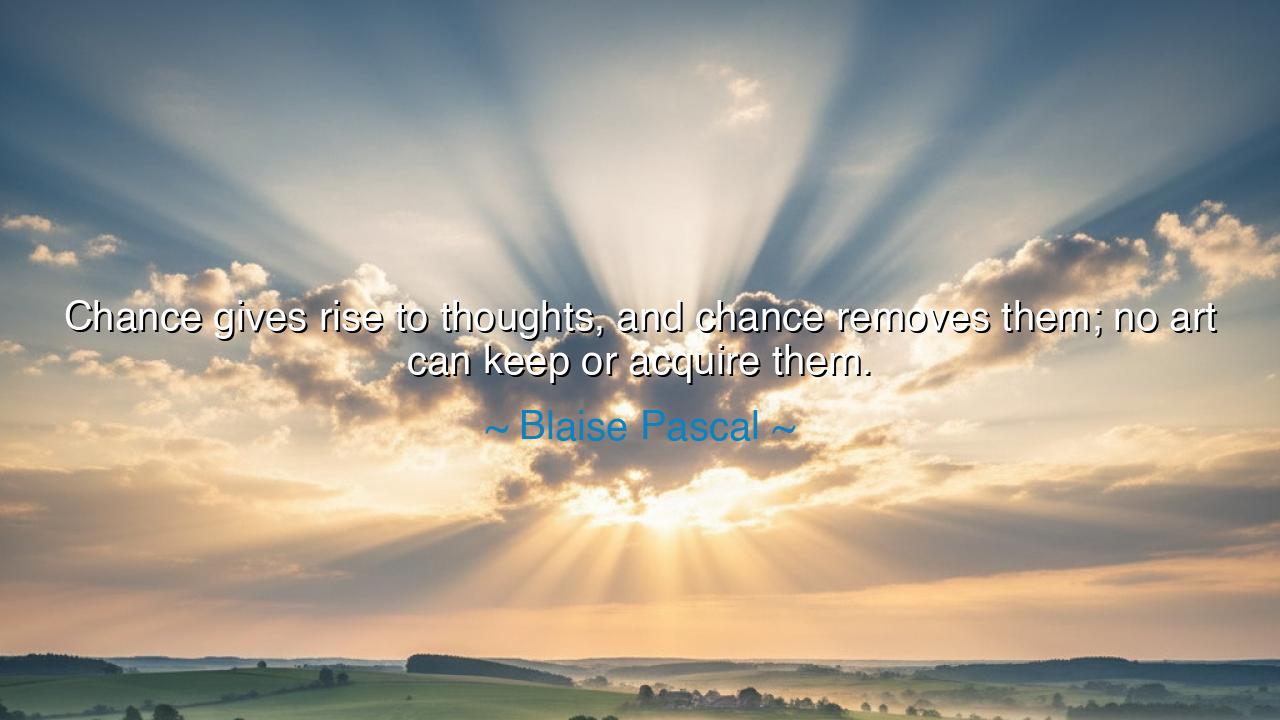
Chance gives rise to thoughts, and chance removes them; no art
Chance gives rise to thoughts, and chance removes them; no art can keep or acquire them.






Chance gives rise to thoughts, and chance removes them; no art can keep or acquire them. These profound words from Blaise Pascal, a man of reason and reflection, ring with the echo of human experience, a recognition of the capricious nature of the mind. It is as though he speaks from the very heart of existence, telling us of the fleeting nature of our thoughts, how they come like the wind—unbidden, unpredictable—and depart just as suddenly. How often do we experience this? One moment, we are struck by a thought of great importance, only to have it vanish as though it had never been. Chance, it seems, has both the power to bring forth our most brilliant insights and the ability to take them away, leaving us with nothing but the memory of their fleeting presence.
Consider the nature of a dream—how it arises unbidden in the night, filled with significance, perhaps even guiding us towards some deep understanding. Yet, when the dawn breaks, that same dream slips away like water through our fingers, leaving only a shadow of its former power. This is the essence of chance. It is the unpredictable force that touches our minds, shaping our thoughts, guiding us towards revelations we can scarcely understand, only for them to be stolen from us just as quickly. No art, no technique, no mastery of the mind can capture these fleeting moments. They come and go as they please, beyond our control, beyond our design.
In this truth, there is both a deep sorrow and a profound wisdom. The great philosophers of antiquity often spoke of the unpredictable nature of human life, and in this, they found humility. Socrates, that wise and humble man, knew that true knowledge was not the possession of many great thoughts but the recognition of how few thoughts we can truly hold. Even Aristotle, the master of reason, spoke of the limitations of human intellect, acknowledging that much of our existence is ruled by forces beyond our understanding. Chance is one of these forces, an uncontrollable tide that sweeps through our thoughts, sometimes nurturing them, and sometimes carrying them away.
History is filled with those who have understood the force of chance in shaping great moments. Take, for example, the story of Archimedes, the brilliant Greek mathematician. He is said to have discovered the principle of buoyancy while stepping into a bath, suddenly struck by the realization that the amount of water displaced was related to the volume of his body. This thought came to him in a moment of chance, yet it changed the course of science forever. He is said to have run through the streets shouting, "Eureka!"—his mind aflame with the brilliance of his discovery. And yet, as quickly as the thought came, it could have vanished, lost in the noise of everyday life. It was chance that gave birth to the thought, but it was discipline and attention that allowed him to give it life.
Pascal's wisdom reminds us that our thoughts—the ones that arise from the depths of the mind—are not always within our grasp. They are gifts from the world of chance, and in their transience, they remind us of our own impermanence. We are mere vessels, vessels that can be filled and emptied by forces beyond our control. And yet, this is not a cause for despair, but for awareness. The art of living is not to hold onto every thought, for many will slip through our fingers like grains of sand, but rather to recognize the fleeting beauty of each thought as it comes and to learn to value the ones that remain.
So, what is the lesson to be drawn from these words of Pascal? It is this: we must learn to live with the knowledge that our minds are not ours to command. Chance will guide us, will lead us to insights, but it will also take them away. The key is not in trying to force these thoughts to stay, but in embracing their ephemeral nature. We must not mourn their loss, but appreciate their presence when they come, for they may be the seeds of something greater. We must learn to accept the unpredictability of our minds and, like Archimedes, be ready to act when that fleeting thought of brilliance comes to us.
To live in harmony with this truth, let us practice awareness. Let us cultivate the ability to appreciate the fleeting moments of insight, knowing that while we cannot keep them, we can honor them in their moment. When a thought arises, let us greet it with reverence, but let it go when it fades. Reflection, not retention, is the true art. And when the winds of chance blow strong, let us be ready to catch the thought, to hold it in our hearts long enough to give it shape, long enough to let it become something lasting.
In the end, it is not in the grasping of every thought, but in the letting go of many, that we will find our peace. For the thoughts that are meant to remain will find their place, and those that slip away are not lost, but have moved on, perhaps to return in another form, another moment, when the winds of chance are again at our backs. Let us, then, live with the wisdom of Pascal, embracing the fleeting nature of all things, and finding meaning not in their permanence, but in their momentary beauty.






AAdministratorAdministrator
Welcome, honored guests. Please leave a comment, we will respond soon